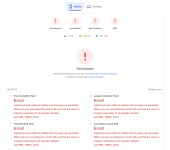Let it serve as a real life use case on how to make a very slow WordPress lightning fast. Everything we do will be shared publicly so that others who may experience the same issue can hopefully resolve theirs by using any of the below tips.
In a nutshell, here is the problem:
A little more details:
We just launched a daily news outlet https://hostingdiscussion.com/news/ covering cloud and web hosting industry. It is based on WordPress. Unfortunately, we've been struggling with site's responsiveness (takes waaaay too long to connect), as well as the speed with which the pages are loading after we finally get on the site. Everything takes TIME. Time we don't have. Besides damaging our chances to rank well, it's hurting the user experience (that never sits well with me). At this point I come to you for help. Whether you are a web hosting professional with WordPress optimization experience, a WordPress developer, a SEO expert — if you have a suggestion what we should do in order to improve and/or fix this, I'd greatly appreciate it, as would everyone else here.
Everything takes TIME. Time we don't have. Besides damaging our chances to rank well, it's hurting the user experience (that never sits well with me). At this point I come to you for help. Whether you are a web hosting professional with WordPress optimization experience, a WordPress developer, a SEO expert — if you have a suggestion what we should do in order to improve and/or fix this, I'd greatly appreciate it, as would everyone else here.
By no means am I a developer or even skilled to understand technical recommendations, but I do have access to a developer who can help along. All of the things we discuss here will be shared with him and results posted.
Let's make a great story out of this.
In a nutshell, here is the problem:
A little more details:
We just launched a daily news outlet https://hostingdiscussion.com/news/ covering cloud and web hosting industry. It is based on WordPress. Unfortunately, we've been struggling with site's responsiveness (takes waaaay too long to connect), as well as the speed with which the pages are loading after we finally get on the site.
By no means am I a developer or even skilled to understand technical recommendations, but I do have access to a developer who can help along. All of the things we discuss here will be shared with him and results posted.
Let's make a great story out of this.

